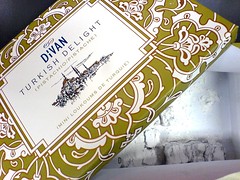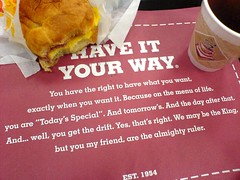Turkish Delight and Sin
Ever since we did C.S. Lewis' "The Lion, the Witch and the Wardrobe" for English class in primary school, we'd thought Edmund Pevensie had gotten himself a really poor return on investment for his soul - just a wee bit of Turkish Delight. And. The Turkish Delight we knew was really foul stuff - a fake rose-flavoured jellylike substance under a veneer of inferior chocolate wrapped in bright pink foil, attempting to look somewhat exotic. Hardly the sort of thing that'd induce you to part with your money, much less your soul. When C.S. Lewis described how Edmund was tempted into betraying his brothers and sisters:
But now that someone's Turkish boyfriend's brought back a box of the real deal: soft as marshmellow, sweet, dusted with powdered sugar, with just the right about of nut, we know how horribly we'd misunderstood Edmund.
It seems that sins*, specific acts of rebellion against God, are quite like that. We think we will never sin in a certain way; we think we will never steal or commit adultery or dishonour our parents or covet our neighbours' property. We think we are fairly honest, trustworthy, faithful (or even heterosexual!), filial...We have delusions of innocence and righteousness when really, it is merely by the grace of God that we have yet to be introduced to the mistaken delights and pleasures of a particular sin and have therefore lacked the opportunity, the temptation, to so sin. May we not be hoodwinked into complacency or arrogance, for it is not that we are unable to sin in a certain way; it is just that, thus far, it hasn't been particularly convenient for our innate sinfulness to rear its ugly head.
*Sins (the plural) are our creative ways of expressing sin (the singular). The most recent Burger King trayliner puts its finger on what sin is:
The Queen let another drop fall from her bottle on to the snow, and instantly there appeared a round box, tied with green silk ribbon, which, when opened, turned out to contain several pounds of the best Turkish Delight. Each piece was sweet and light to the very centre and Edmund had never tasted anything more delicious...At first Edmund tried to remember that it is rude to speak with one's mouth full, but soon he forgot about this and thought only of trying to shovel down as much Turkish Delight as he could, and the more he ate the more he wanted to eat...we'd thought about how truly undelightful Turkish Delight was and assured each other that we could never ever fall the same way as Edmund. And what poor taste that chap had as well! Tsk.
But now that someone's Turkish boyfriend's brought back a box of the real deal: soft as marshmellow, sweet, dusted with powdered sugar, with just the right about of nut, we know how horribly we'd misunderstood Edmund.
It seems that sins*, specific acts of rebellion against God, are quite like that. We think we will never sin in a certain way; we think we will never steal or commit adultery or dishonour our parents or covet our neighbours' property. We think we are fairly honest, trustworthy, faithful (or even heterosexual!), filial...We have delusions of innocence and righteousness when really, it is merely by the grace of God that we have yet to be introduced to the mistaken delights and pleasures of a particular sin and have therefore lacked the opportunity, the temptation, to so sin. May we not be hoodwinked into complacency or arrogance, for it is not that we are unable to sin in a certain way; it is just that, thus far, it hasn't been particularly convenient for our innate sinfulness to rear its ugly head.
*Sins (the plural) are our creative ways of expressing sin (the singular). The most recent Burger King trayliner puts its finger on what sin is:
The rightful ruler of the world is he who created it: God. But we all reject God by trying to run our lives our own way without him, thinking that we, infact, are the real rulers. But, as is evident just by reading the morning papers, we fail to rule our lives, or society, or the world.
From the very beginning, men and women everywhere rejected God by doing things their own way. We all do this. We don't like someone telling us what to do or how to live—least of all God—and so we rebel against him in lots of different ways. We ignore him and just get on with our own lives; or we disobey his instructions for living in his world; or we shake our puny fists in his face and tell him to get lost.
How ever we do it, we are all rebels, because we don't live God's way. We prefer to follow our own desires, and to run things our own way, without God. This rebellious, self-sufficient attitude is what the Bible calls "sin".
We think that obedience is a shameful as being a Subservient Chicken. But that thinking is erroneous because God's instructions are instructions from the good inventor of all that there is. In rejecting God we make a mess not only of our own lives, but of our society and the world. The whole world is full of people bent on doing what suits them, and not following God's ways. We all act like little gods, with our own crowns, competing with one another. The result is misery. The suffering and injustice that we see around us all go back to our basic rebellion against God.
By rebelling against God, we've made a terrible mess of things. The question is: what will God do about it? Read on.
We think that obedience is a shameful as being a Subservient Chicken. But that thinking is erroneous because God's instructions are instructions from the good inventor of all that there is. In rejecting God we make a mess not only of our own lives, but of our society and the world. The whole world is full of people bent on doing what suits them, and not following God's ways. We all act like little gods, with our own crowns, competing with one another. The result is misery. The suffering and injustice that we see around us all go back to our basic rebellion against God.
By rebelling against God, we've made a terrible mess of things. The question is: what will God do about it? Read on.










4 Comments:
Gives me an idea of which primary school you might have come from, actually. I remember that book, and glimpses of the cabinet still surface in my mind from which we were able to borrow some other books from the series. And now I still have a ongoing love affair with the Chronicles of Narnia... My wife and I bought a beautiful book with all the books combined together in full colour, hardback, bookmarked glory.
I like the BK liner. It's really something we keep doing, subconsciously and at times consciously putting ourselves at the center of everything. And while I never thought much of the Turkish Delight analogy - I didn't know what it was, and Mr Lewis' description made me drool so I assumed it was very nice - it does make me stop short to think...
Thanks for the reminder.
It does? Hmmmm...we never had a cabinet with the other books in the series.
:-)
Wow, that book sounds great. Got a photo of it?
Oops. Different schools then hehe...
I'll try and look for it and post it. Popular now has a more glitzy version of it on sale for over 50 bucks...
About choosing Turkish Delight over the longterm joys of the King:
In the bible, Esau also chose a pot of stew over his inheritance.
It sounds strange & some readers may say 'Unbelievable! what a ridiculous story!! Who would do that??' --- until we realise that ALL of us have done the same thing at one time or another, choosing short-term pleasure over the long-term satisfaction that only Christ can give.
The following is taken from Billy Graham's book 'Peace with God':
" Perhaps you say you are having a pretty good time sinning -- and you well may.
The Bible says there is a certain pleasure in sin. However, it is short lived and fatal.
Would one single person among us ever pass up a piece of ripe delicious fruit to select a rotten piece that was crawling with worms and reeking with decay,
if we were not driven to that choice by sinister powers of evil?
Yet that is exactly what we do over and over again.
We constantly pass up the rich and beautiful and ennobling experiences and seek out the tawdry, the cheap, and the degrading.
the loneliest soul of all is the man whose life is steeped in sin.
Yet there is forgiveness for you. As you confess and forsake your sins, your fellowship with Christ will be restored, even for backslidden christians. 'If we confess our sins, he is faithful and just to forgive us our sins and to cleanse us from all unrighteousness' (1John 1:9).
Christ can give you power to break the ropes, fetters and chains of sin, but you must repent, confess and surrender yourself to Him first.
Right now, it can be settled, and you can know the peace, joy and fellowship of Christ. "
To your readers reading this: Contact a local church or Christian near you to find out more.
- Ming Ju
Post a Comment
Subscribe to Post Comments [Atom]
<< Home